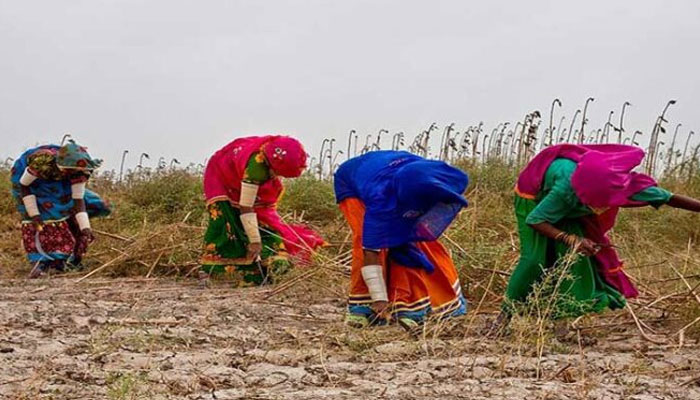Stakeholders host consultations on women farm workers’ law
KARACHI: A pivotal meeting of the Provincial Stakeholders Alliance for the Empowerment of Women Agricultural Workers in Sindh, on Tuesday, emphasised the urgent need to finalise the rules of the Sindh Agriculture Women Workers Act to ensure the rights of women peasants.
The event, organised by AwazCDS-Pakistan and NARI Foundation in collaboration with the Sindh Human Rights Commission (SHRC), brought together representatives from civil society organisations, government bodies, activists, media, academics, and advocates at a local hotel.
Chairman of the SHRC Iqbal Detho highlighted the importance of enforcing provincial labour laws consistent with both constitutional provisions and International Labour Organisation (ILO) conventions, of which Pakistan has ratified 34. He underscored the necessity of implementing key ILO conventions, including Convention 138 on minimum employment age and Convention 182 on the worst forms of child labour.
Detho said, “Our provincial labour framework must fully embrace and implement fundamental workplace principles,” advocating for non-discrimination policies, equal pay, freedom of association, collective bargaining rights and comprehensive social security protections.
The SHRC chairperson urged the social protection and social welfare departments to take proactive measures to safeguard workers’ rights, affirming the commission’s commitment to ensuring equitable workplace conditions across the province. He detailed ongoing initiatives and strategic legal reforms aimed at aligning national laws with ILO standards, recommending the expansion of hazardous labour definitions and the implementation of minimum wage laws.
Secretary of the Human Rights Department Tehseen Fatima addressed the socio-economic challenges faced by women agricultural workers, emphasising that entrenched feudal hierarchies leave them particularly vulnerable. She asserted, “Empowering women agricultural workers means addressing the systemic inequities they face daily,” and called for decisive action to dismantle the power structures that have historically marginalised agricultural labourers.
Reju Mal from the labour department provided an overview of the Sindh Women Agricultural Workers Act of 2018, noting that it extends labour rights typically reserved for formal sector workers to agricultural workers. This legislation marks a significant milestone, recognising agricultural workers’ rights to unionise and include gig and religious workers in the labour code.
Professor Ismail Kumbhar from Sindh Agriculture University emphasised the importance of educating women workers about their rights, particularly in the challenging poultry and agricultural sectors. He proposed extending the Benazir Card to landless labourers, advocating for improved safety standards and access to resources like water and land control.
Anwar Mahar of NARI Foundation shared insights on the Women’s Agriculture Council’s advocacy initiatives aimed at empowering women in rural agriculture, further highlighting the collaborative efforts needed to address these critical issues.
-
 Bangladesh Sees High Turnout In Landmark National Election
Bangladesh Sees High Turnout In Landmark National Election -
 Lufthansa Cancels Hundreds Of Flights Amid Pilot And Cabin Crew Strike
Lufthansa Cancels Hundreds Of Flights Amid Pilot And Cabin Crew Strike -
 Video: Prince Harry Tears Up Talking Of His Court Case & Children: ‘Don’t Feel Shame Even If A Judge Makes Demands'
Video: Prince Harry Tears Up Talking Of His Court Case & Children: ‘Don’t Feel Shame Even If A Judge Makes Demands' -
 King Charles Issues New Statement For ‘carers’ Two Days After Promising To Support Police Action Against Andrew
King Charles Issues New Statement For ‘carers’ Two Days After Promising To Support Police Action Against Andrew -
 Gene Simmons Makes Major Claim Against Rock & Roll Hall Of Fame
Gene Simmons Makes Major Claim Against Rock & Roll Hall Of Fame -
 Vladyslav Heraskevych Disqualified From Winter Olympics 2026 Over Helmet Controversy
Vladyslav Heraskevych Disqualified From Winter Olympics 2026 Over Helmet Controversy -
 Late James Van Der Beek Inspires Bowel Cancer Awareness Post Death
Late James Van Der Beek Inspires Bowel Cancer Awareness Post Death -
 ByteDance’s New AI Video Model ‘Seedance 2.0’ Goes Viral
ByteDance’s New AI Video Model ‘Seedance 2.0’ Goes Viral -
 Archaeologists Unearthed Possible Fragments Of Hannibal’s War Elephant In Spain
Archaeologists Unearthed Possible Fragments Of Hannibal’s War Elephant In Spain -
 Khloe Kardashian Reveals Why She Slapped Ex Tristan Thompson
Khloe Kardashian Reveals Why She Slapped Ex Tristan Thompson -
 ‘The Distance’ Song Mastermind, Late Greg Brown Receives Tributes
‘The Distance’ Song Mastermind, Late Greg Brown Receives Tributes -
 Taylor Armstrong Walks Back Remarks On Bad Bunny's Super Bowl Show
Taylor Armstrong Walks Back Remarks On Bad Bunny's Super Bowl Show -
 Pal Exposes Sarah Ferguson’s Plans For Her New Home, Settling Down And Post-Andrew Life
Pal Exposes Sarah Ferguson’s Plans For Her New Home, Settling Down And Post-Andrew Life -
 James Van Der Beek's Impact Post Death With Bowel Cancer On The Rise
James Van Der Beek's Impact Post Death With Bowel Cancer On The Rise -
 Blake Lively, Justin Baldoni At Odds With Each Other Over Settlement
Blake Lively, Justin Baldoni At Odds With Each Other Over Settlement -
 Thomas Tuchel Set For England Contract Extension Through Euro 2028
Thomas Tuchel Set For England Contract Extension Through Euro 2028




